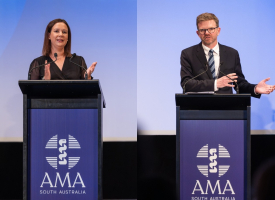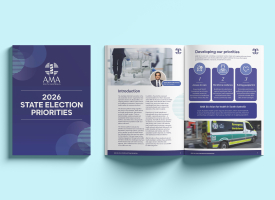New framework to deal with the identification and management of vexatious notifications
In response to the AMAs calls, AHPRA released a framework to support the identification and management of vexatious notifications in December 2020, hopefully taking another step forward to improve their process of notification.

Dr Chris Moy, Chair Medical Practice Committee
The AMA understands how intensely distressing receiving a notification from the Australian Health Practitioner Regulation Agency (AHPRA) is to every medical professional. It is one of our key areas of advocacy and something we focus on each and every year.
In response to the AMAs calls, AHPRA released a framework to support the identification and management of vexatious notifications in December 2020, hopefully taking another step forward to improve their processes.
This framework has been a long time in development and stems from two Senate reports into the Medical complaints process in Australia and the Complaints mechanism administered under the Health Practitioner Regulation National Law.
One of the key issues identified in evidence to these inquiries was that of vexatious complaints. Many health practitioners argued that complaints are too often made for vexatious reasons, using the complaints process as a tool of bullying and harassment, including by other health practitioners.
In its submission to the second inquiry the AMA called for the AHPRA complaints handling mechanisms to be improved by developing a system to triage and remove complaints that are clearly vexatious.
This evidence led to the Senate recommending that AHPRA and the national boards develop and publish a framework for identifying and dealing with vexatious complaints.
Having commissioned research on this issue, AHPRA published a research report in 2018 Reducing, identifying and managing vexatious complaints: Summary report of a literature review prepared for the Australian Health Practitioner Regulation Agency.
This research was the first international literature review of vexatious complaints in health practitioner regulation. The report found that the number of vexatious complaints dealt with in Australia and internationally is small, representing less than one per cent but concluded that these complaints have a significant impact on practitioners’ lives.
The AMA continued to raise this issue with Ahpra and the Medical Board, urging further action be taken to enable vexatious complaints to be identified and managed earlier in the notification process thereby reducing harm to the practitioner.
Following detailed consultation with the AMA in the second half of 2020, Ahpra released its new framework to support the identification and management of vexatious notifications. This framework outlines:
-
principles and features of vexatious notifications
-
the significant impacts of vexatious notifications
-
potential indicators of vexatious notifications
-
how to identify vexatious notifications, and
-
what to do where there is a concern that a notification is vexatious.
At the urging of the AMA, the framework also reinforces that health practitioners should not make vexatious complaints about other health practitioners. Vexatious notifications made by a registered health practitioner with the intent of harming another practitioner are taken seriously. A Board can take action against a practitioner who makes a vexatious notification about another health practitioner. This includes investigating the practitioner and, where vexatiousness is apparent, taking action that could affect the practitioner’s registration. Vexatious notifications do not have good faith protections under the National Law.
It is hoped that this framework will provide Ahpra staff with a better understanding of what a vexatious complaint might look like and how to manage one when they have identified it.
Ahpra CEO Martin Fletcher said the publication of the Framework was “an important milestone in more rapidly responding to concerns about the potential vexatiousness of a complaint.”
In 2021 the AMA will be asking Ahpra for an assessment of the implementation of this framework and looking for a demonstrable decrease in practitioner burden in their metrics.



